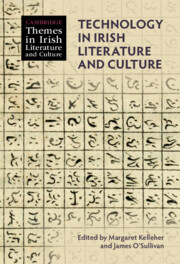Book contents
- Technology in Irish Literature and Culture
- Cambridge Themes in Irish Literature and Culture
- Technology in Irish Literature and Culture
- Copyright page
- Epigraph
- Contents
- Contributors
- Cambridge Themes in Irish Literature and Culture
- Acknowledgements
- Introduction
- Part I Genealogies
- Part II Infrastructures
- Chapter 5 Electric Signs and Echo Chambers: The Stupidity of Affect in Modern Irish Literature
- Chapter 6 Literature and the Technologies of Radio and Television
- Chapter 7 ‘The Re-Tuning of the World Itself’: Irish Poetry on the Radio
- Part III Invention
- Part IV The Digital
- Index
- References
Chapter 7 - ‘The Re-Tuning of the World Itself’: Irish Poetry on the Radio
from Part II - Infrastructures
Published online by Cambridge University Press: 19 January 2023
- Technology in Irish Literature and Culture
- Cambridge Themes in Irish Literature and Culture
- Technology in Irish Literature and Culture
- Copyright page
- Epigraph
- Contents
- Contributors
- Cambridge Themes in Irish Literature and Culture
- Acknowledgements
- Introduction
- Part I Genealogies
- Part II Infrastructures
- Chapter 5 Electric Signs and Echo Chambers: The Stupidity of Affect in Modern Irish Literature
- Chapter 6 Literature and the Technologies of Radio and Television
- Chapter 7 ‘The Re-Tuning of the World Itself’: Irish Poetry on the Radio
- Part III Invention
- Part IV The Digital
- Index
- References
Summary
The history of Irish poetry, like the history of Ireland itself, has long been bound up with the broadcast voices that radiate into, and out of, its shores and the walls of its homes. This essay registers the poetic resonances of radio on the island of Ireland by considering both the traces of the medium that appear in poetry and prose by Louis MacNeice, Eavan Boland, Leontia Flynn, Seamus Heaney, and others, and by examining the cultural role and aesthetic qualities of works produced for radio, with a particular attention to Austin Clarke’s weekly poetry broadcasts (made between 1939 and 1955) and his radio play ‘As the Crow Flies’ (1942). By merging Clarke’s interest in traditional Irish prosody and myth with the demands of writing for a mass medium, ‘As the Crow Flies’ offers an allegory of the futile search for meaning, and shelter, in a world convulsed by violence.
Keywords
- Type
- Chapter
- Information
- Technology in Irish Literature and Culture , pp. 118 - 134Publisher: Cambridge University PressPrint publication year: 2023

